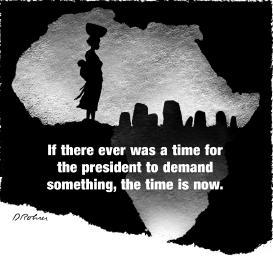Issue Date: October 3, 2003
President Bush proposed a historic foreign aid initiative to Africa, but Congress now threatens to make that pledge empty rhetoric By CHRISTINE VLADIMIROFF Like many others who work to end hunger, I was both skeptical and hopeful about President Bush’s high-profile trip to Africa this summer. Why would the most powerful world leader -- a leader whose policies show scant regard for poor people at home -- pay a visit to the poorest and weakest of our neighbors in this global village? Was it a clever political maneuver to court the African-American vote in next year’s election? Was it to reinforce the façade of “compassionate conservatism” with headlines and colorful photo-ops? Most likely, yes and yes. But I also think the president truly is convinced that the plight of suffering people a hemisphere away actually does have something to do with our own country’s troubles. That “persistent poverty and oppression can lead to hopelessness and despair, and when governments fail to meet the basic needs of their people, these failed states can become havens of terror.” Those were his exact words when he announced his new foreign assistance initiative, the Millennium Challenge Accounts, in March 2002. Originally greeted with cautious enthusiasm by the church and the Washington advocacy community, the Millennium Challenge Accounts aim to help poor countries that have managed to establish good governments with relatively little corruption. Potentially, it could help poor people feed their families, provide access to clean drinking water, fight infectious diseases and enable more children to go to school. Unexpected, coming from this president. But so was his State of the Union address in January, when he announced his $15 billion Emergency Plan for AIDS Relief. Together, the Millennium Challenge Accounts and AIDS proposals would more than double current U.S. spending on poverty-focused development assistance. Bush basked in praise for these historic foreign assistance proposals during his trip to Africa. He is the first president to visit the continent in his first term of office, and one could argue that he has shown more interest in Africa than any other U.S. president. “Seldom has history offered a greater opportunity to do so much for so many,” he said. If we follow through, the promises the president -- and by extension, we as U.S. citizens -- have made to Africa and the rest of the developing world could mark the beginning of the end of widespread hunger, poverty and disease. People of faith -- Catholics and Protestants, Jews and Muslims -- have rallied behind President Bush’s visionary foreign assistance proposals. Grassroots lobbying organizations like Bread for the World and other respected anti-hunger and poverty advocates have mobilized to show their support for the full funding of the Millennium Challenge Accounts and AIDS initiatives. But now that the appropriations process is underway, the president seems content to let Congress unravel the very programs he went to Africa to promote. The Republican-led House of Representatives is slashing the president’s initiatives to fight hunger, poverty and AIDS around the world. So far, the House has approved only $800 million for the Millennium Challenge Accounts ($500 million less than the president’s request), while the Senate Appropriations Committee has approved $1 billion in funding for it for the 2004 fiscal year. The Emergency Plan for AIDS Relief, signed into law by the president in May, has been appropriated only $2 billion by the House and Senate Appropriations Committee for the 2004 fiscal year, $1 billion short of the $3 billion authorized. The rule in Washington is that the White House proposes and Congress disposes. But a popular president can make demands on Congress. If there ever was a time for the president to demand something, the time is now. Some 186 million people in sub-Saharan Africa -- including 31 million children under the age of 5 -- suffer from hunger. Thirty million are living with HIV/AIDS, which killed 2.4 million Africans in 2002, and nearly 11 million children have been orphaned by AIDS in the region. Helping the people of Africa is not only the strategic thing to do, it’s the right thing to do. In their statement “A Place at the Table,” the Catholic bishops of the United States acknowledged the important role of government in the effort “to overcome poverty and defend human dignity.” Currently, the U.S. government spends less than half a percent of our wealth on poverty-focused development assistance to other countries. That’s less than any other developed nation in the world. We can do better than that. Scripture and Catholic social teaching call us to do better than that. If Congress fails to follow through on our commitment to fight hunger, poverty and AIDS, our duplicity will not go unnoticed. We must keep our promises to poor countries. Sr. Christine Vladimiroff is prioress of the Benedictine Sisters of Erie, Pa., and a board member of Bread for the World. National Catholic Reporter, October 3, 2003 |
